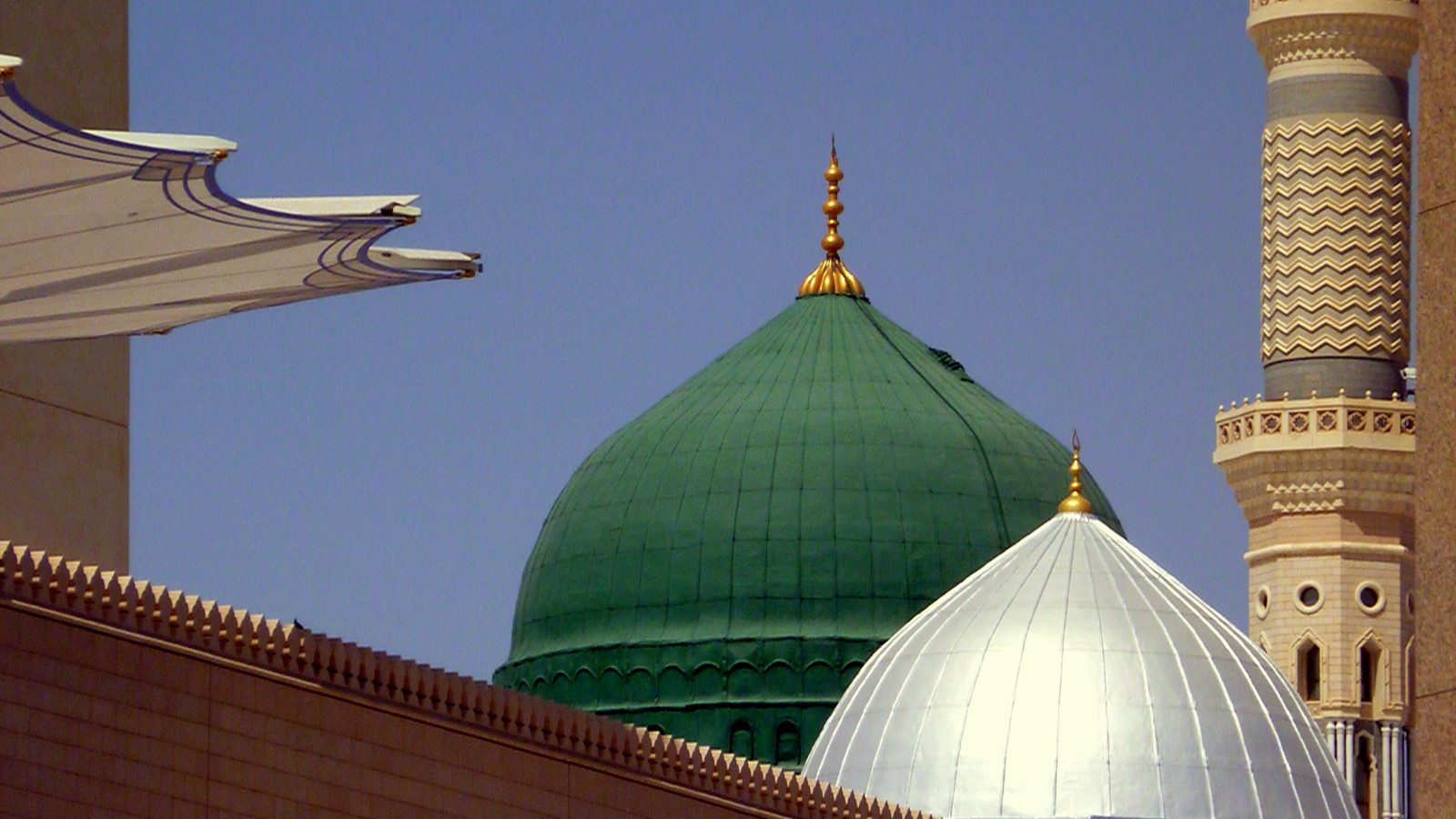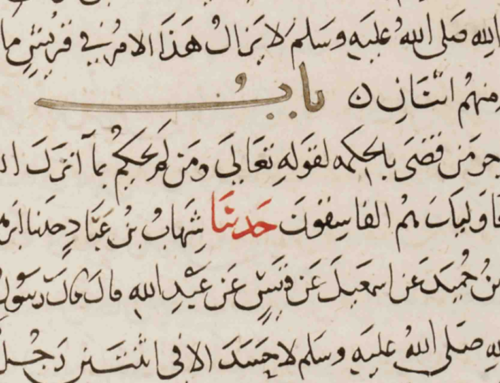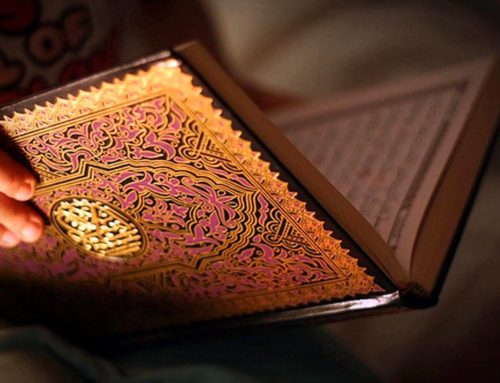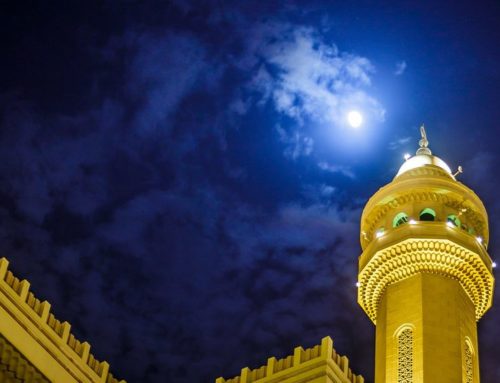Translated by Ismaeel Nakhuda
(Translator’s Preface: Mawlana Khalil Ahmad Sahranpuri (1852-1927) was a leading hadith master and the teacher of perhaps one of the world’s leading hadith authorities of the last century, Shaykh al-Hadith Mawlana Muhammad Zakariyya Kandhalwi (1898-1082). A leading Sufi of the Chishti, Naqshbandi, Suhrawardi and Qadri tariqahs, he was one of the profound students and khalifahs of Imam Rabbani Mawlana Rashid Ahmad Gangohi (1829-1905), and the author of Badhl al-Majhud, one of the most authoritative commentaries of Imam Abu Dawud’s Sunan.
Below is a translation of an excerpt from Mawlana Khalil Ahmad’s landmark Al-Barahin al-Qati‘ah ‘ala Dhalam al-Anwar al-Sati‘ah (The Decisive Proofs on the Darkness of Al-Anwar al-Sati‘ah), which was written in 1887 in response to another polemical work, Mawlana ‘Abd al-Sami‘ Rampuri’s [1]Also a khalifah of Haji Imdad Allah Muhajir Makki (translator). Anwar al-Sati‘ah Dur Bayan Mawlud Wa Fatiha. Anwar al-Sati‘ah was written in 1886 in refutation of Imam Rabbani Mawlana Rashid Ahmad Gangohi’s position on customary practices and bid‘ah.
The Urdu-version of Al-Barahin has been written in a typical-style of polemics in which pages are divided into two halves—the top half contains the refuted text with the refutation below. This format has been preserved in this online-rendering. Readers will first read the text of Anwar al-Sati‘ah and then Mawlana Khalil Ahmad’s refutation.
It should also be noted that instead of refuting Al-Barahin in a scholarly fashion, Mawlana Ahmad Rada Khan (1856-1921) felt compelled to misquote texts from Al-Barahin to declare Mawlana Khalil Ahmad a kafir in Husam al-Haramayn, a piece of writing that was written a couple of decades later in 1906.)
An Excerpt from Al-Barahin al-Qati‘ah [2]Al-Barahin al-Qatiah (p. 50-53) Published by Kutub Khana Imdadiyya, Deoband.
Mawlana ‘Abd al-Sami‘ writes:
I say, the belief (‘aqidah) of the Ahl al-Sunnah wa ’l-Jama‘ah is that the quality (sifah) of Allah Most High—in that same way and in that same reality—is particular to Allah Most High and cannot be found in another. The meaning of being particular is that it is found in Him and not in another, and being present on every place of the face of the earth is not something particular or special with god. It is inside Ma‘alim al-Tanzil, Risalah Barzakh [3]I assume the book Mawlana ‘Abd al-Sami‘ is referring to is Sharh al-Sudur bi Sharh Hal al-Mawta wa ’l-Qubur (translator). of Jalal al-Din al-Suyuti (may Allah have mercy on him) and Sharh al-Mawahib al-Ladunniyyah of ‘Allamah Zurqani (may Allah have mercy on him) that the Angel of Death possesses all of the souls of the jinn, mankind, animals and all of creation; and that Allah has made the world in front of him like a small tray. It has come in one narration that it is like a large basin and so he takes from here and there. Meaning he takes lives from here and there. Now, think how many ants, mosquitoes, insects, beasts, birds and men die at one time between the east and the west; at every place the Angel of Death is present. It is in Mishkat al-Masabih that at the time of death, the Angel of Death is at the head side of believers and disbelievers. This is a lengthy hadith.
Qadi Thana Allah has narrated in Tadhkirah al-Mawta a hadith from al-Tabrani and Ibn Mundah, it is mentioned in this [hadith] that the Angel of Death told the Messenger of Allah (may Allah bless him ad grant him peace), “There is no such house of good or bad men which I am not attentive towards. Night and day I keep watch and know every young and old in the way that they do not know themselves.”
It is understood from these hadiths that the Angel of Death is present in all places. The Angel of Death is actually a close angel; look Satan is present at every place. In the juristic issues of prayer in Al-Durr al-Mukhtar it is written that Satan remains with the children of Adam during the day and his son remains with men during the night. ‘Allamah al-Shami has written in his commentary to this that Satan remains with all of the children of Adam, except those who have been saved by Allah, after that he writes, “And He (Allah) has given him the ability of this in the same way that He has given the Angel of Death over the same.” In other words Allah Most High has given Satan the ability for this, in the same way that He has given the Angel of Death the ability to be present in every place. His words end.
Now, understand its example in the abode of sensing bodies (ajsam-e-mahsusah), if a person was to travel across the Earth’s population from the east to the west, then, wherever he goes, he will find the moon present and will also find the sun. Then, if he says that one moon is present in all places and one sun is present in all places, then, according to your rule, that person will become a kafir in that he has said that the moon is present in every place. However, reality is that the person is not a mushrik or a kafir, he is a good Muslim.
Hence, in the same way, understand that while the sun is present in every place, it is present in the lowliest heaven. The soul of the Messenger (may Allah send peace and blessings upon him) is in the seventh heaven in the ‘illiyyin. From there, if his blessed sight can fall on the entire earth, or on some places or sites, and every pure gathering from every direction becomes, from the drizzle of the lights of the Ahmadi lustre (fayd), like the beams of the encompassing sun, then is that impossible or remote?
‘Allamah Zurqani (may Allah have mercy on him) has mentioned the poem of Abu al-Tib in Sharh al-Mawahib al-Ladunniyyah in the chapter regarding visiting the noble grave:
Like the sun in the centre of the sky, and its light,
Envelops countries, from the east and the west,
Like the full moon, from whence you turn, you see it,
It guides to your eyes piercing light.
In other words, in the same way that the sun is in the middle of the sky, and its light spreads from east to west; and in the same way from whichever angle you look at the moon, from that place it will grant light to your eyes. His words end.
Hence, the difference is that Allah Almighty has kept open the eye to see the sun and the moon, from which a person, who can see, says that the moon is present in all places. A person born blind would say that the moon is nowhere. Hence, in the same way, the seeing of the soul is dependent on the bounty of Allah Most High. If He opens the eye within and raises the veil then man is able to see the Ahmadi lustre.
Imam Sha‘rani has written in Mizan, “Surely, it has reached us from Abu al-Hasan al-Shadhili and his student, Abu al-Abbas al-Mursi, and others, that they used to say, ‘If seeing the Messenger of Allah was to vanish [from us] for even [the duration of] the blinking of an eye, then we would not count ourselves from the body of the Muslims.’”
Now, look at which ruling and fatwa these friends of Allah would come under according to these respected muftis of pure ‘aqidah? And [regarding] the presence of the souls of the Prophets (may Allah bless him and grant him peace) in the ‘illiyyin on the seventh heaven, which we have mentioned, look at Tafsir ‘Azizi in the section regarding ‘illiyyin. However, in spite of being in the ‘illiyyin, his soul has a strong connection to the noble grave, he knows every visitor, who has come for ziyarah, he replies to all of their salam. In the grave, the noble body is alive.
Zurqani (may Allah have mercy on him) has written, “Indeed the Prophet is at the Rafiq al-Ala and his body is in his grave replying to the salam of he who sends salam.” More research of this will be mentioned in the section affirming the noble mawlid.
Now, it should be considered that when the moon and the sun are present in all places, and that Satan is present at every place on earth, and that the Angel of Death is present in every place, then how can this attribute be particular to god? And it is a spectacle that the people of the gatherings of milad do not claim that the Messenger of Allah, peace and blessings upon him, is present in all of the world’s places, [regardless of whether they are] pure and impure, and [regardless of whether they are] religious or irreligious gatherings. The presence of the Angel of Death and Iblis in even more places—pure and impure and of kufr and non-kufr—denotes, to an extent, that according to your presentation of proofs it should be that all these hadith scholars and jurists, on account of the belief of the presence in every place of the Angel of Death and Iblis, are more mushrik than those who hold the gatherings of the noble mawlid. Allah forbid. One must weep over this type of intelligence and knowledge.
Let it be clear to the people of truth that it is not our claim that the blessed soul comes to every gathering. Yes, it is our claim that if this is someone’s belief then he is not a mushrik.
Mawlana Khalil Ahmad writes:
I say, the ‘aqidah of the Ahl al-Sunnah is that an attribute from the attributes of the Almighty cannot be in the slave, and whatever shadow of His attributes is given to one, then there is no possibility of there being more than that in that person (in other words more than what has been given). The attributes of hearing, seeing, knowledge and the right of disposal (tasarruf) are the actual attributes (haqiqi) of the Almighty and figurative (majazi) for the creation. “There is none like him…” Then, whoever has been given whatever amount of knowledge and power etc. such a person can never increase it, even to a speck. The means given to Satan and the Angel of Death, and the manner in which the sun and the moon have been created, [they] do not have the ability to do more [than what they have been created for] and no one can take more work from them, and nor does the increasing or decreasing in merit depend on the plentitude or shortage [of their power].
Sayyiduna Musa (peace be upon him) is superior and more excellent than Sayyiduna Khidhr (peace be upon him). In spite of this, his knowledge of kashf (unveiling) was much less than that of Sayyiduna Khidhr (peace be upon him). And the amount [of kashf] that Sayyiduna Khidhr (peace be upon him), had, he did not have the ability to have more. And Sayyiduna Musa (peace be upon him), in spite of being superior, did not have kashf and nor could he create kashf equalling to that, which Sayyiduna Khidhr (peace be upon him), had.
Hence, the manner and vastness of light in which the sun and the moon have been created, and the vastness of knowledge that the Angel of Death and Satan have been given, this can be understood from observation [in relation to the sun and the moon] and from definite texts (qat‘i nusus) [in relation to the Angel of Death and Satan]. Now, to analogize a superior entity on them [and say] that the superior entity has equal or more [of an attribute] than the inferior entity is not the work of an intelligent person of knowledge.
Firstly, tenets of faith are not analogical (qiyasi) that they may be established through analogy. Rather they are decisive (qat‘i), they are established through decisive scriptural texts [to such an extent] that singular hadiths [khabar wahid] are of no benefit. Hence, its (qiyas) use as proof will only be worthy of attention when the author (Mawlana ‘Abd al-Sami‘ Rampuri) supports it (the qiyas) with decisive texts. And, in opposition to the entire Ummah, if the creation’s ‘aqidah is being made corrupt through an invalid analogy, then when will this be worthy of attention?
Secondly, the Quran and hadith establish the contrary, so how can the opposite of this be accepted? Rather, all of the author’s statements are inadmissible. The Pride of the World (upon him be peace) himself says, “By Allah, I do not know what will be done with me or with you.” (hadith). Shaykh ‘Abd al-Haqq relates, “I do not even know what is behind this wall.” The issue of the marriage session has also been written in Al-Bahr al-Ra’iq [4]“And this is a famous fiqh issue mentioned in Al-Bahr al-Ra’iq, Alamghiriyya, Durr al-Mukhtar etc that if a person marries making witness the Almighty and the Pride of the World (may Allah bless … Continue reading and other works.
Thirdly, if greater merit really entails this, then all Muslims, even if corrupt (fasiq), and the author himself, are of more merit than Satan. So the author should, on account of his own presumption, affirm that the lay masses, on account of their merit, must have equal, if not greater, knowledge of the unseen than Satan. And the author, in my presumption, is a man of a high level of faith, then, being definitely superior to Satan, he must be more knowledgeable than Satan. Allah be our refuge. One is also astonished and grieved by such ignorance from the author, how far the uttering of such worthless words is from knowledge and intelligence.
In sum, it should be noted that having seen the state of Satan and the Angel of Death, [if] affirming to the Pride of the World (peace be upon him) knowledge that encompasses the earth (ilm-e-muhit-e-zamin)—while being at odds with decisive texts, without proof and with [the support of] only a wrong analogy—is not shirk then which section of faith (iman) is it? Such vastness of knowledge is established for Satan and the Angel of Death through scriptural texts (nass); through which decisive scriptural text (nass qat‘i) has the Pride of the World’s vastness of knowledge [been established] that one should affirm an act of shirk through the rejection of all scriptural texts?
And, with regards to the meaning of khassah—having read Tahdhib al-Mantiq, [5]Tahdhib al-Mantiq is a book on logic by Shaykh Sa’d al-Din Taftazani. Khassah is a terminology specifically used in logic and explained in the main text (translator). the author, having memorised [it], has chosen an unrefined belief. However, masha Allah, it is still far from [his] understanding. The khassah of the Almighty’s knowledge is that His knowledge is an innate (dhati) and actual (haqiqi) attribute, which necessitates the encompassment of everything. And the entire creation’s knowledge is a figurative reflection (majazi dhilli), in that a portion of this endowment is gained from the Almighty. Hence, the honoured presence of the [Prophet’s] blessed soul (may Allah bless him and grant him peace) in the upper portion of the uppermost heaven (a‘la ‘illiyyin) and his being superior to the Angel of Death in no way necessitates that his knowledge in such issues is equal to that of the Angel of Death, let alone more. Accordingly, the reasons for this have been mentioned above. And affirming it through analogy is ignorance, in that even a little knowledge cannot be permitted from this. The purpose [of the above] is that the author’s nonsense research is only [due to his] ignorance, he may not be involved in shirk but has opened the way for the world [to be involved in shirk].
After this, [regarding] the stories of the saints (walis) of Allah that the author has mentioned, then, firstly, these stories are not proofs in Shari‘ah that can affirm a ruling, especially in respect to ‘aqidah. So, accepting these stories, while rejecting scriptural texts, is something not expected from the ignorant let alone a scholar. The answer [to them], if one was to accept them [as proof], is that the Almighty revealed [to those friends of Allah] that they acquired this presence of knowledge. If our Pride of the Worlds (may Allah bless him and grant him peace) has a thousand times more [kashf], then this is possible. However, which scriptural text is there for proof, in action, that he has been given [knowledge of the unseen] that one should make this one’s ‘aqidah and that the address in the gatherings of mawlud be made in the second person (hadir)?
This issue cannot be proved through a mere possibility, it needs to have happened through action and for this to be established it is necessary (wajib) that this is [proved] through a scriptural text. However, the author’s poor understanding is a spectacle, in that he does not understand anything. And this discussion is when someone, having established ilm-e-zati (personal knowledge) for him (the Prophet [peace be upon him]), believes this, as is the belief of the ignorant. If one believes that the Almighty presents him (the Prophet [peace be upon him]) [in the gatherings of mawlud] having informed then this is not shirk. However, believing in this without a Shari‘ah proof is not correct and to make this one’s ‘aqidah without proof is a cause for sin. Now, it has become clear that no hadith scholar, jurist and god-fearing Sufi is a polytheist. However, whoever’s belief is according to what the author has written, then such a person is a mushrik. And to bring these texts and narrations as proof of their baseless claims is only [an indication of] the author’s poor understanding. Or else, there is no proof [supporting] the claims of the author, as is apparent.
| ↑1 | Also a khalifah of Haji Imdad Allah Muhajir Makki (translator). |
|---|---|
| ↑2 | Al-Barahin al-Qatiah (p. 50-53) Published by Kutub Khana Imdadiyya, Deoband. |
| ↑3 | I assume the book Mawlana ‘Abd al-Sami‘ is referring to is Sharh al-Sudur bi Sharh Hal al-Mawta wa ’l-Qubur (translator). |
| ↑4 | “And this is a famous fiqh issue mentioned in Al-Bahr al-Ra’iq, Alamghiriyya, Durr al-Mukhtar etc that if a person marries making witness the Almighty and the Pride of the World (may Allah bless him and grant him peace) then one becomes kafir for holding the belief that the Pride of the World (may Allah bless him and grant him peace) has knowledge of the unseen (ghayb). Hence, kafir has only been mentioned in relation to the belief of knowing of a marriage session (in other words this is unconditional). No one has written [with the stipulation] that the person will become a kafir if his belief is that [the Prophet’s knowledge] is equal to that of Allah’s in amount and manner (in other words conditional) and otherwise not.” (Al-Barahin al-Qati‘ah, page. 49) |
| ↑5 | Tahdhib al-Mantiq is a book on logic by Shaykh Sa’d al-Din Taftazani. Khassah is a terminology specifically used in logic and explained in the main text (translator). |






